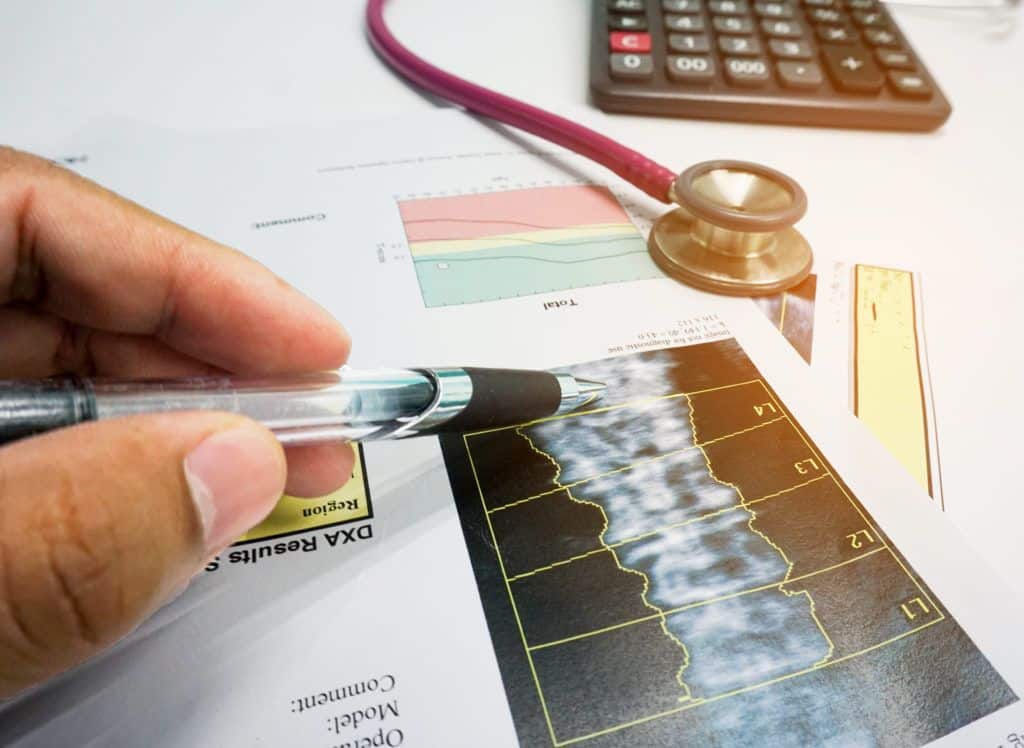At LaSalle General Hospital’s Radiology Department, we pride ourselves on offering state-of-the-art imaging services. Among these, our bone density testing stands out as a crucial tool in diagnosing conditions like osteoporosis. This article delves into the details of bone density testing, answering common questions you might have.
What is a bone density test?
A bone density test, often referred to as a DEXA scan, measures the amount of calcium and other minerals present in a segment of bone. This test helps in predicting the risk of bone fractures and determining the presence of osteoporosis. (source)
Why is a bone density test done?
Bone density tests are primarily done to diagnose or assess the risk of osteoporosis, a condition where bones become weak and brittle. It’s also used to monitor osteoporosis treatment outcomes.
How does a DEXA scan work?
A DEXA (Dual-Energy X-ray Absorptiometry) scan uses low-dose X-rays to measure the mineral content in bones, usually the spine, hip, and forearm. The results are then compared to the bone density of a healthy individual.
How do I prepare for a bone density test?
Generally, no special preparations are needed. However, you might be asked to avoid taking calcium supplements for at least 24 hours before the test.
How much does a bone density test cost?
The cost can vary based on location and insurance coverage. It’s advisable to check with LaSalle General Hospital’s Radiology Department for specific pricing.
Are there any risks associated with bone densitometry?
The test is safe with minimal risks. The amount of radiation used is less than the radiation in a standard chest X-ray.
Where can I get a bone density test near me?
You can schedule a bone density test at LaSalle General Hospital’s Radiology Department.
How often should I get a bone density test?
It’s typically recommended every 2 years, but frequency can vary based on age, bone density results, and other factors.
What do the results of a bone density test mean?
Results are given in T-scores and Z-scores, which compare your bone density to a healthy young adult and people of your age, gender, and ethnicity, respectively.
How long does a bone density test take?
The test usually takes about 10 to 30 minutes.
Is a bone density test painful?
No, the test is non-invasive and painless.
Do insurance plans cover bone density tests?
Most insurance plans, including Medicare, cover bone density tests, but it’s best to check with your provider.
At what age should I start getting bone density tests?
Women aged 65 and older and men aged 70 and older should consider getting the test. Those with risk factors might start earlier.
Can men have bone density tests?
Yes, especially if they have risk factors for osteoporosis.
How is osteoporosis diagnosed with a bone density test?
A T-score of -2.5 or lower indicates osteoporosis.
Are there any alternatives to DEXA scans for measuring bone density?
Yes, alternatives include quantitative computed tomography (QCT) and ultrasound of the heel.
What’s the difference between a bone density test and an X-ray?
While both use X-rays, a bone density test measures bone strength and predicts fracture risk, whereas an X-ray visualizes the bone structure.
Can I eat or drink before a bone density test?
Yes, but avoid taking calcium supplements 24 hours before the test.
What should I wear for a bone density test?
Wear comfortable clothing without metal zippers, belts, or buttons.
What do I do if my bone density test results are abnormal?
Consult with your healthcare provider for guidance and potential treatment options.
Bone density testing is a crucial tool in maintaining bone health and preventing conditions like osteoporosis. If you have concerns about your bone health or are considering a bone density test, reach out to LaSalle General Hospital’s Radiology Department for expert guidance.

